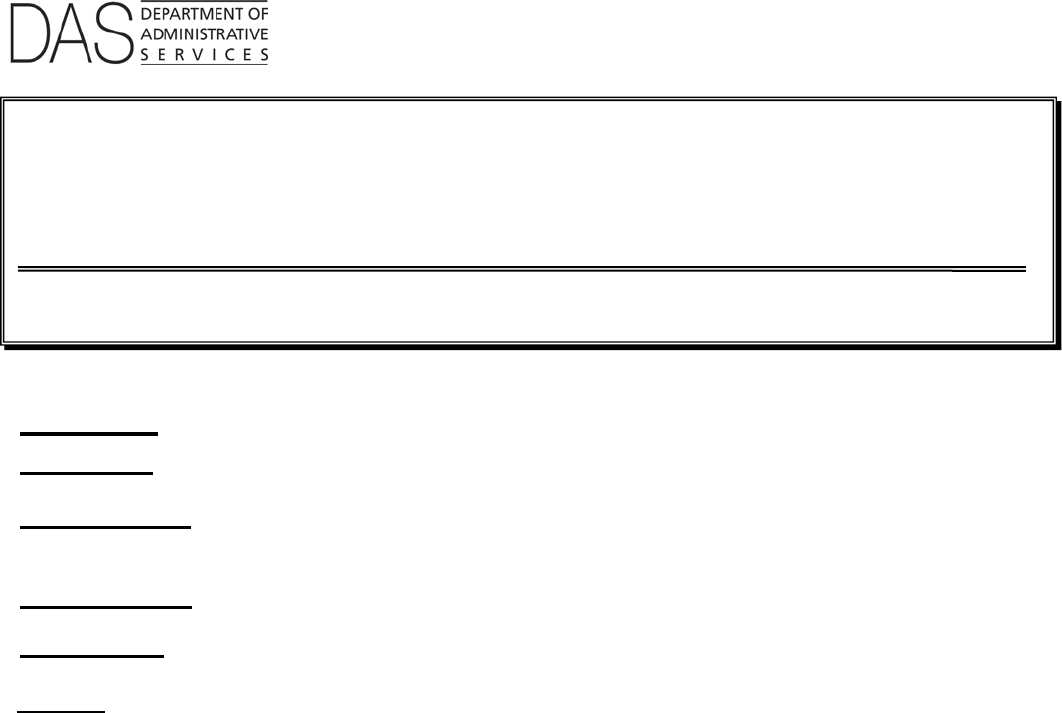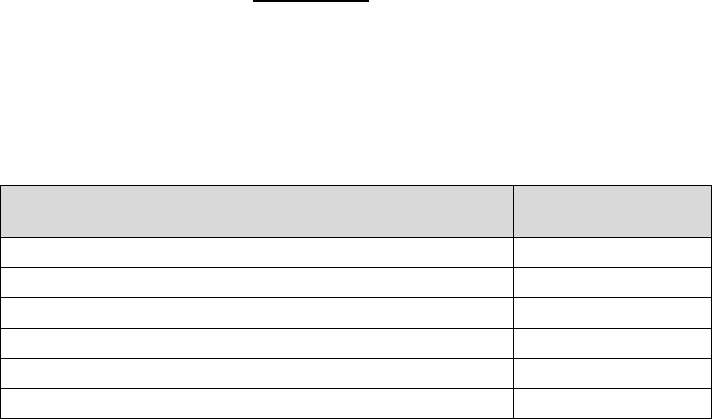
Policy: 60.000.05
1 of 5
Effective: 1/01/2024
APPROVED: Signature on file with the Chief Human Resources Office
State HR Policy
SUBJECT:
Vacation Leave
NUMBER:
60.000.05
DIVISION:
Chief Human Resources Office
EFFECTIVE DATE:
1/01/24
POLICY
STATEMENT:
Vacation leave is an accrued benefit of paid time off granted to any eligible
employee for reasons determined by the employee.
AUTHORITY: ORS 240.145(3); 240.240; 240.250; 240.551.
APPLICABILITY:
All employees except temporary employees and employees represented by a
collective bargaining agreement.
ATTACHMENTS:
None
DEFINITIONS:
Refer to State HR Policy 10.000.01, Definitions.
POLICY:
(1)
An employee accrues vacation leave based on their “recognized service date,” which is established
upon initial appointment to state service.
(a)
The following types of state service are used to determine an employee’s recognized service
date:
(A) Actual hours worked in the classified, management, or unclassified service.
(B) Time spent on paid leave.
(C) Time spent as a seasonal employee.
(D) Time spent employed with the Judicial Branch, Legislative Branch, or any entity with
which the Department of Administrative Services has an intergovernmental agreement
that specifies an employee’s recognized service date transfers within the last two years
from the date of appointment in the Executive Branch.
(E) Time spent on the following approved leave without pay:
(i)
Peace Corps
(ii)
Military leave
(iii)
Family and medical leave

State HR Policy
Vacation Leave
60.000.05
Policy: 60.000.05
2 of 6
Effective: 1/01/2024
(iv)
Workers compensation
(b)
Except for reasons listed in (1)(a)E), the agency adjusts the recognized service date to reflect
leave without pay over 15 consecutive calendar days. The adjustment reflects the actual
number of days on leave without pay.
(c)
Upon re-employment within two years of separation, the agency adjusts the recognized service
date to reflect the break in service by showing the actual number of days separated. If the
separation lasts longer than two years, the date of rehire becomes the new recognized service
date.
(d)
A re-employed seasonal employee retains their original recognized service date. Missed time
does not affect the recognized service date because the state credits each season as a “full
season,” regardless of its length (unless the employee resigns before the end of the season).
(e)
Accrual Rates
(A) Employees accrue vacation leave based on their recognized service date as follows:
(i)
Classified and unclassified unrepresented employees
Months Worked
Accrual Rate
Per Month
First month through 60th month
8 hours
61st month through 120th month
10 hours
121st month through 180th month
12 hours
181st month through 240th month
14 hours
241st month through 300th month
16 hours
After 300th month
18 hours
(ii)
Unclassified executive service, unclassified excluded and management
service employees
Months Worked
Accrual Rate
Per Month
First month through 60th month
10.00 hours
61st month through 120th month
11.34 hours
121st month through 180th month
13.34 hours
181st month through 240th month
15.34 hours
241st month through 300th month
17.34 hours
After 300th month
19.34 hours

State HR Policy
Vacation Leave
60.000.05
Policy: 60.000.05
3 of 6
Effective: 1/01/2024
(iii)
Department of Justice unclassified excluded and Department of Justice
unclassified unrepresented attorneys
Months Worked
Accrual Rate
Per Month
First month through 60th month
10.00 hours
61st month through 120th month
11.34 hours
121st month through 180th month
13.34 hours
181st month through 240th month
15.34 hours
241st month through 300th month
17.34 hours
After 300th month
18.00 hours
(B) A part-time employee, a full-time employee who has leave without pay during the
month, or an employee beginning work after the first working day of the month will
accrue vacation leave on a pro rata basis.
(C) The agency will include actual time worked and all leave with pay in determining the pro
rata accrual of vacation leave each month.
(D) With the approval of the Director of the Department of Administrative Services, an
agency head may be granted any accrual rate listed in Section (1)(e)(A)(ii), not to
exceed 19.34 hours per month, in accordance with State HR Policy 60.000.20,
Alternate Leave Provisions.
(f)
Eligibility
(A) An employee is eligible to use accrued vacation leave hours on or after the first of the
month following the month in which the hours were earned. Exceptions appear in State
HR Policy 60.000.20, Alternative Leave Provisions.
(B) An employee who works an academic year may take vacation leave during the
academic year. The employee will receive one year of credit toward the vacation
accrual rate for each completed academic year. Vacation leave will not accrue during
time off between academic years.
(g)
Leave Request
(A) An employee may use accrued vacation leave with prior approval from the employee’s
supervisor.

State HR Policy
Vacation Leave
60.000.05
Policy: 60.000.05
4 of 6
Effective: 1/01/2024
An employee is eligible to use accrued vacation leave hours for absences that qualify under
State HR Policy 60.000.15, Family and Medical Leave.
(h)
Cancellation of Leave
(A) The designated supervisor may cancel previously approved time off to meet workload
needs. The agency can direct an employee to return from vacation leave if an emergent
need arises.
(B) In the event the supervisor must revoke previously granted vacation leave, the agency
head or designee may approve reimbursement to the employee for non-refundable or
non-exchangeable travel expenses. Non-refundable and non-exchangeable travel
expenses include, but are not limited to, deposits and purchases such as airline tickets,
vacation packages, and hotel or rental deposits. Reimbursements will be based solely
on documented non-refundable or non-exchangeable out-of-pocket costs for the
employee only. Any expenditure incurred prior to the date of approval or after
revocation of the vacation leave is not reimbursable.
(i)
Accumulation of Vacation Leave
(A) Classified unrepresented, unclassified unrepresented, management service,
unclassified executive service, unclassified excluded, Department of Justice
unclassified excluded employees and Department of Justice unclassified
unrepresented attorneys shall not accumulate vacation leave exceeding 350 hours.
(i)
An employee who has earned 310 or more hours of vacation leave may ask to
use leave time to avoid losing it.
(ii)
An employee who is in danger of losing vacation leave will receive notice of the
impending loss with their paycheck on the first of the month. The first notice will
occur two months before the loss will occur. The notice will repeat the following
month.
(iii)
An employee will immediately lose any vacation leave exceeding 350 hours if
they fail to use the excess hours in the month before reaching the maximum
allowable accrual.
(B) An appointing authority may authorize a cash payment up to 60 hours, upon
determining the granting of vacation leave is not appropriate. The supervisor must
document the denial of the vacation leave request. Cash payout for denied vacation
leave is not allowed more than once in each fiscal year.
(j)
Annual Cash Out Option
(A) A regular status employee may make a one-time request to cash out and receive payment
for up to 40 hours of vacation leave once per calendar year. Employees must have a
remaining balance of at least 60 hours of vacation leave to be eligible for the cash-out
option.

State HR Policy
Vacation Leave
60.000.05
Policy: 60.000.05
5 of 6
Effective: 1/01/2024
(B) At the time of an employee’s cash-out request, the agency will consider any pre-approved
vacation leave to determine if the minimum vacation balance requirement is maintained.
(k)
Donation of Vacation Leave
(A) An eligible employee may voluntarily donate vacation leave to an individual
employee for whom a donated leave bank has been established in
accordance with State HR Policy 60.025.01, Donated Leave; State HR Policy
60.020.05, Military Donated Leave Program; or an applicable collective bargaining
agreement.
(B) Donations must occur in whole hours.
(l)
Effect of Employee Movement on Vacation Leave Hours
(C)
If an employee accepts an appointment to another agency to which this policy applies
during the six months prior to their eligibility to use vacation leave, the new agency must
assume their unused vacation leave.
(D)
Appointments after Six Months of Service
(i)
When an employee has gained six months of service and accepts an
appointment in the same agency, they retain their accrued vacation leave
balance, up to the maximum balance permitted by policy or collective
bargaining agreement.
(ii)
When an employee has gained six months of service and accepts an
appointment to a position in a different agency, the employee may elect to
transfer a maximum of 100 hours of accrued vacation leave hours to the new
agency. The new agency may agree to accept a greater amount. The losing
agency pays the employee for accrued vacation leave hours not transferred to
the gaining agency up to a maximum of 300 hours.
(m)
Vacation Pay Out Upon Separation
(E)
An employee who has completed six months of service and separates from state
service will be paid for all unused vacation leave up to 300 hours at the time of
separation.
(F)
An employee who has not completed six months of service and separates from state
service will not receive pay for earned but unused vacation leave. Hours accrued but
unused due to ineligibility for use are retained for up to two years from the date of
separation.
(n)
Restoration of Vacation Accrual Rate Upon Re-employment
(A) An employee who separates from state service and returns within two years of the date
of separation will receive state service credit toward vacation accrual rates. Refer to
Section (1)(a-d).

State HR Policy
Vacation Leave
60.000.05
Policy: 60.000.05
6 of 6
Effective: 1/01/2024
(B) Unused vacation leave hours accrued while in an exempt (other than legislative) or
academic unclassified position, in a manner comparable to this policy, may be restored
upon immediate appointment to a classified unrepresented, management service or
unclassified position. Vacation leave hours accrued in an exempt position in the
Legislative Branch shall be restored according to ORS 173.005.
